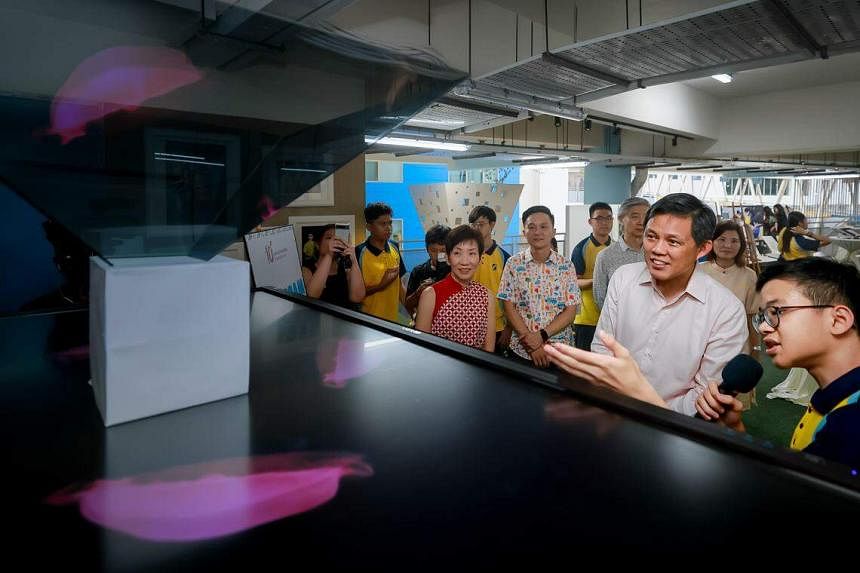SINGAPORE - Specialised schools such as Crest Secondary School and Spectra Secondary School will continue to play an integral role in Singapore’s variegated education landscape, Education Minister Chan Chun Sing said on Thursday evening.
“With the roll-out of full subject-based banding, there were many who asked me, ‘will the Ministry of Education (MOE) continue to support Crest and Spectra?’” he said.
Under full subject-based banding, classes in secondary schools will have a mix of students of different abilities.
Speaking at Crest Secondary’s 10th anniversary celebrations held at the school in Jurong, Mr Chan said Singapore needs a diversity of school options to cater to different student profiles.
Crest and Spectra are specialised schools for Normal (Technical) students which offer similar programmes that cover academic and vocational subjects.
Each takes in about 200 students per year.
“Crest and Spectra employ a skills-based, pedagogical approach to help their students learn better, to help them realise their potential and their strengths,” said Mr Chan.
MOE will continue to commit its resources and support to make sure that students have this option.
Not everyone was convinced when Crest was set up more than a decade ago, he said.
“There was no example for us to follow, but instead, we had a group of pioneers who believed.
“When there were no syllabus and curriculum, they developed it. When there were no internship opportunities, they searched for them.
“When there was a lack of resources, they found them.”
He added: “Today, after 10 years of hard work, we see the fruits of their labour.”
In 2022, about 95 per cent of the students in the two schools had their offers to progress to the Institute of Technical Education (ITE) confirmed, after accepting early conditional offers through ITE’s early admissions exercise.
Schools like Crest are important because they aim to bring out the best in students no matter their starting point, said Mr Chan.
“The mark of Singapore is not just how well we stretch the top; it is also how well we take care of those in need.
“Many of the students in Crest are amongst the most in need in Singapore.”
He added: “It is our job as an education fraternity to help these students realise their potential.”
Crest Secondary alumnus Nur Halif Abdullah Sani, 22, who was from its pioneer batch and graduated in 2016, said he knew he wanted to be a chef in primary school.
“It was partly because of my mum’s good cooking and watching cooking shows on (local Malay television channel) Suria together,” he said.
“At that time, there was no other secondary school like Crest, which offered modules like culinary and restaurant operations, so I chose it without any hesitation.”
Specialising in hospitality and retail service, he took part in a one-month Industry Experiential Programme at Prive restaurant, where he picked up basic cooking and knife skills.
He later completed a Nitec in Western Culinary Arts at ITE, and has found his niche in French cuisine.
Mr Halif has since worked at more than five restaurants like Les Bouchons, and is now a junior sous chef at Frenchie Wine Bar.
“The attachments, starting with the one at Prive, were really beneficial as they helped me to widen my network and start my career,” he said.
Another Crest alumnus, Mr Julian Ee, 22, said: “I neglected my studies in primary school and was doing a lot of sport.

“When I first saw my Primary School Leaving Examination score, it didn’t really affect me... but I saw the look on my father’s face and that really woke me up.
“I didn’t want to disappoint anyone any more.”
Crest was his first choice because of its practical offerings, which he said gave him an advantage later on in his Nitec course in Web applications at ITE and the diploma programme in information technology at Ngee Ann Polytechnic.
With a grade point average of 3.8 out of 4 in polytechnic, he has earned a place to read computer science at Nanyang Technological University after his national service.
“Most people in this degree programme are quite ‘up there’... I’m looking forward to making new friends in university and expanding my network,” he said.


